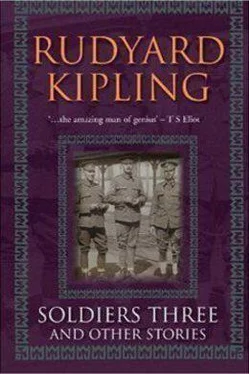Rudyard Kipling - Soldiers Three
Здесь есть возможность читать онлайн «Rudyard Kipling - Soldiers Three» весь текст электронной книги совершенно бесплатно (целиком полную версию без сокращений). В некоторых случаях можно слушать аудио, скачать через торрент в формате fb2 и присутствует краткое содержание. Год выпуска: 2014, Издательство: epubBooks Classics, Жанр: Классическая проза, на английском языке. Описание произведения, (предисловие) а так же отзывы посетителей доступны на портале библиотеки ЛибКат.
- Название:Soldiers Three
- Автор:
- Издательство:epubBooks Classics
- Жанр:
- Год:2014
- ISBN:нет данных
- Рейтинг книги:5 / 5. Голосов: 1
-
Избранное:Добавить в избранное
- Отзывы:
-
Ваша оценка:
- 100
- 1
- 2
- 3
- 4
- 5
Soldiers Three: краткое содержание, описание и аннотация
Предлагаем к чтению аннотацию, описание, краткое содержание или предисловие (зависит от того, что написал сам автор книги «Soldiers Three»). Если вы не нашли необходимую информацию о книге — напишите в комментариях, мы постараемся отыскать её.
Soldiers Three — читать онлайн бесплатно полную книгу (весь текст) целиком
Ниже представлен текст книги, разбитый по страницам. Система сохранения места последней прочитанной страницы, позволяет с удобством читать онлайн бесплатно книгу «Soldiers Three», без необходимости каждый раз заново искать на чём Вы остановились. Поставьте закладку, и сможете в любой момент перейти на страницу, на которой закончили чтение.
Интервал:
Закладка:
These things being made, I returned to the Thana, and the goat was slain, and certain portions of the walls were blackened with fire, and each man dipped his clothes a little into the blood of the goat. Know, O Sahib, that a wound made by man upon his own body can, by those skilled, be easily discerned from a wound wrought by another man. Therefore, the Havildar, taking his tulwar, smote one of us lightly on the forearm in the fat, and another on the leg, and a third on the back of the hand. Thus dealt he with all of us till the blood came; and Suruj Bul, more eager than the others, took out much hair. O Sahib, never was so perfect an arrangement. Yea, even I would have sworn that the Thana had been treated as we said. There was smoke and breaking and blood and trampled earth.
'Ride now, Maula Baksh,' said the Havildar,'to the house of the Stunt Sahib, and carry the news of the dacoity. Do you also, O Afzal Khan, run there, and take heed that you are mired with sweat and dust on your incoming. The blood will be dry on the clothes. I will stay and send a straight report to the Dipty Sahib, and we will catch certain that ye know of, villagers, so that all may be ready against the Dipty Sahib's arrival.'
Thus Maula Baksh rode and I ran hanging on the stirrup, and together we came in an evil plight before The Tiger of Gokral–Seetarun in the Rohestri tehsil. Our tale was long and correct, Sahib, for we gave even the names of the dacoits and the issue of the fight and besought him to come. But The Tiger made no sign, and only smiled after the manner of Sahibs when they have a wickedness in their hearts. 'Swear ye to the rapport?' said he, and we said: 'Thy servants swear. The blood of the fight is but newly dry upon us. Judge thou if it be the blood of the servants of the Presence, or not.' And he said: 'I see. Ye have done well.' But he did not call for his horse or his devil–carriage, and scour the land as was his custom. He said: 'Rest now and eat bread, for ye be wearied men. I will wait the coming of the Dipty Sahib.'
Now it is the order that the Havildar of the Thana should send a straight report of all dacoities to the Dipty Sahib. At noon came he, a fat man and an old, and overbearing withal, but we of the Thana had no fear of his anger; dreading more the silences of The Tiger of Gokral–Seetarun. With him came Ram Baksh, the Havildar, and the others, guarding ten men of the village of Howli—all men evil affected towards the Police of the Sirkar. As prisoners they came, the irons upon their hands, crying for mercy—Imam Baksh, the farmer, who had denied his wife to the Havildar, and others, ill–conditioned rascals against whom we of the Thane bore spite. It was well done, and the Havildar was proud. But the Dipty Sahib was angry with the Stunt for lack of zeal, and said 'Dam–Dam' after the custom of the English people, and extolled the Havildar. Yunkum Sahib lay still in his long chair. 'Have the men sworn?' said Yunkum Sahib. 'Aye, and captured ten evildoers,' said the Dipty Sahib. 'There be more abroad in your charge. Take horse—ride, and go in the name of the Sirkar!' 'Truly there be more evil–doers abroad,' said Yunkum Sahib, 'but there is no need of a horse. Come all men with me.'
I saw the mark of a string on the temples of Imam Baksh. Does the Presence know the torture of the Cold Draw? I saw also the face of The Tiger of Gokral–Seeta–run, the evil smile was upon it, and I stood back ready for what might befall. Well it was, Sahib, that I did this thing. Yunkum Sahib unlocked the door of his bath–room, and smiled anew. Within lay the six rifles and the big Police–book of the Thana of Howli! He had come by night in the devil–carriage that is noiseless as a ghoul, and moving among us asleep, had taken away both the guns and the book! Twice had he come to the Thana, taking each time three rifles. The liver of the Havildar was turned to water, and he fell scrabbling in the dirt about the boots of Yunkum Sahib, crying—'Have mercy!'
And I? Sahib, I am a Delhi Pathan, and a young man with little children. The Havildar's mare was in the compound. I ran to her and rode: the black wrath of the Sirkar was behind me, and I knew not whither to go. Till she dropped and died I rode the red mare; and by the blessing of God, who is without doubt on the side of all just men, I escaped. But the Havildar and the rest are now in jail.
I am a scamp? It is as the Presence pleases. God will make the Presence a Lord, and give him a rich Mem–sahib as fair as a Peri to wife, and many strong sons, if he makes me his orderly. The Mercy of Heaven be upon the Sahib! Yes, I will only go to the bazar and bring my children to these so–palace–like quarters, and then—the Presence is my Father and my Mother, and I, Afzal Khan, am his slave.
Ohe, Sirdar–ji! I also am of the household of the Sahib.
Gemini
Great is the justice of the White Man—greater the power of a lie.
—Native Proverb.This is your English Justice, Protector of the Poor. Look at my back and loins which are beaten with sticks—heavy sticks! I am a poor man, and there is no justice in Courts.
There were two of us, and we were born of one birth, but I swear to you that I was born the first, and Ram Dass is the younger by three full breaths. The astrologer said so, and it is written in my horoscope—the horoscope of Durga Dass.
But we were alike—I and my brother who is a beast without honour—so alike that none knew, together or apart, which was Durga Dass. I am a Mahajun of Pali in Marwar, and an honest man. This is true talk. When we were men, we left our father's house in Pali, and went to the Punjab, where all the people are mud–heads and sons of asses. We took shop together in Isser Jang—I and my brother—near the big well where the Governor's camp draws water. But Ram Dass, who is without truth, made quarrel with me, and we were divided. He took his books, and his pots, and his Mark, and became a bunnia —a money–lender—in the long street of Isser Jang, near the gateway of the road that goes to Montgomery. It was not my fault that we pulled each other's turbans. I am a Mahajun of Pali, and I always speak true talk. Ram Dass was the thief and the liar.
Now no man, not even the little children, could at one glance see which was Ram Dass and which was Durga Dass. But all the people of Isser Jang—may they die without sons!—said that we were thieves. They used much bad talk, but I took money on their bedsteads and their cooking–pots and the standing crop and the calf unborn, from the well in the big square to the gate of the Montgomery road. They were fools, these people—unfit to cut the toe–nails of a Marwari from Pali. I lent money to them all. A little, very little only—here a pice and there a pice. God is my witness that I am a poor man! The money is all with Ram Dass—may his sons turn Christian, and his daughter be a burning fire and a shame in the house from generation to generation! May she die unwed, and be the mother of a multitude of bastards! Let the light go out in the house of Ram Dass, my brother. This I pray daily twice—with offerings and charms.
Thus the trouble began. We divided the town of Isser Jang between us—I and my brother. There was a landholder beyond the gates, living but one short mile out, on the road that leads to Montgomery, and his name was Muhammad Shah, son of a Nawab. He was a great devil and drank wine. So long as there were women in his house, and wine and money for the marriage–feasts, he was merry and wiped his mouth. Ram Dass lent him the money, a lakh or half a lakh—how do I know?—and so long as the money was lent, the landholder cared not what he signed.
The People of Isser Jang were my portion, and the landholder and the out–town was the portion of Ram Dass; for so we had arranged. I was the poor man, for the people of Isser Jang were without wealth. I did what I could, but Ram Dass had only to wait without the door of the landholder's garden–court, and to lend him the money; taking the bonds from the hand of the steward.
Читать дальшеИнтервал:
Закладка:
Похожие книги на «Soldiers Three»
Представляем Вашему вниманию похожие книги на «Soldiers Three» списком для выбора. Мы отобрали схожую по названию и смыслу литературу в надежде предоставить читателям больше вариантов отыскать новые, интересные, ещё непрочитанные произведения.
Обсуждение, отзывы о книге «Soldiers Three» и просто собственные мнения читателей. Оставьте ваши комментарии, напишите, что Вы думаете о произведении, его смысле или главных героях. Укажите что конкретно понравилось, а что нет, и почему Вы так считаете.












